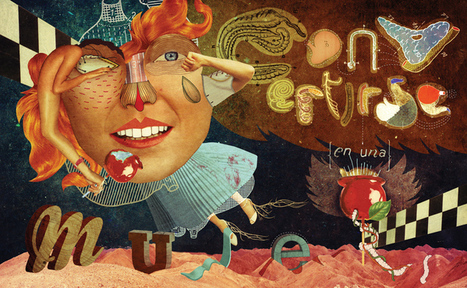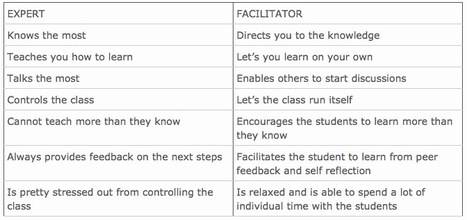Get Started for FREE
Sign up with Facebook Sign up with X
I don't have a Facebook or a X account
 Your new post is loading... Your new post is loading...
 Your new post is loading... Your new post is loading...
Sample Student's curator insight,
May 5, 2015 10:14 PM
We often ask our students to create annotated bibliographies, and this focuses on their capacity to evaluate and make decisions about the validity, reliability and relevance of sources they have found. using Scoop.it, we can ask them to do much the same thing, but they will publish their ideas for an audience, and will also be able to provide and use peer feedback to enhance and tighten up their thinking. This is relevant to any curriculum area. Of course it is dependent on schools being able to access any social media, but rather than thinking about what is impossible, perhaps we could start thinking about what is possible and lobbying for change.
Sample Student's curator insight,
May 5, 2015 10:18 PM
We often ask our students to create annotated bibliographies, and this focuses on their capacity to evaluate and make decisions about the validity, reliability and relevance of sources they have found. Using Scoop.it, we can ask them to do much the same thing. But they will publish their ideas for an audience, and will also be able to provide and use peer feedback to enhance and tighten up their thinking. This is relevant to any age, and any curriculum area. Of course it is dependent on schools being able to access social media. But rather than thinking about what is impossible, perhaps we should start thinking about what is possible, and lobbying for change. Could you use a Scoop.it collection as an assessment task? |

Alfredo Corell's curator insight,
June 7, 2013 6:44 PM
An expert always provides feedback on the next steps....
A facilitator... facilitates the student to learn from peer feedback and self reflection 
Begoña Iturgaitz's curator insight,
June 13, 2013 11:44 AM
focus on chart. The other ideas are the ones we've been dealing with for...ten years? Nire iritziz taula da interesgarriena. Gainerako ideiek +10 urte? dauzkate.
Sample Student's curator insight,
May 5, 2015 10:14 PM
We often ask our students to create annotated bibliographies, and this focuses on their capacity to evaluate and make decisions about the validity, reliability and relevance of sources they have found. using Scoop.it, we can ask them to do much the same thing, but they will publish their ideas for an audience, and will also be able to provide and use peer feedback to enhance and tighten up their thinking. This is relevant to any curriculum area. Of course it is dependent on schools being able to access any social media, but rather than thinking about what is impossible, perhaps we could start thinking about what is possible and lobbying for change.
Sample Student's curator insight,
May 5, 2015 10:18 PM
We often ask our students to create annotated bibliographies, and this focuses on their capacity to evaluate and make decisions about the validity, reliability and relevance of sources they have found. Using Scoop.it, we can ask them to do much the same thing. But they will publish their ideas for an audience, and will also be able to provide and use peer feedback to enhance and tighten up their thinking. This is relevant to any age, and any curriculum area. Of course it is dependent on schools being able to access social media. But rather than thinking about what is impossible, perhaps we should start thinking about what is possible, and lobbying for change. Could you use a Scoop.it collection as an assessment task? |














If you are curious to know what I think about curation and search and their future, check out this 3-minute audio excerpt from a much longer interview about curating your experience I had with Joel Zasflosky of ValueofSimple.
In it I highlight how inadequate is to expect Google results to fulfill the need that many people have to learn and deepen their knowledge about a topic they are not familiar with.
Google set of very specific, highly filtered and ranked text results represent many, often relevant, individual bites of a larger puzzle that is never shown.
You are provided tons of individual trees in place of the "forest" you have asked about.
That is the greatest limitation for Google… when it comes the need, not to find a specific book, product, event or person, but for learning, understanding, for seeing the bigger picture, then the individual bites, ranked by Google authority or Pagerank, just don't serve our need.
This is why, just like we can't feed our appetites only with Big Macs, when it comes to learning about a topic we're not familiar with, we will increasingly rely on curated search engines, trusted guides and portals who can provide us with a much better and more useful roadmap into learning than Google can.
Audio excerpt: https://soundcloud.com/user458849/curation-and-search-joel
Full interview: http://valueofsimple.com/smart-and-simple-matters-podcast-023-with-robin-good/
MP3 full interview: http://traffic.libsyn.com/valueofsimple/023_SmartAndSimpleMattersPodcastFromValueOfSimple.mp3
Subscribe to iTunes podcast: http://valueofsimple.com/itunes